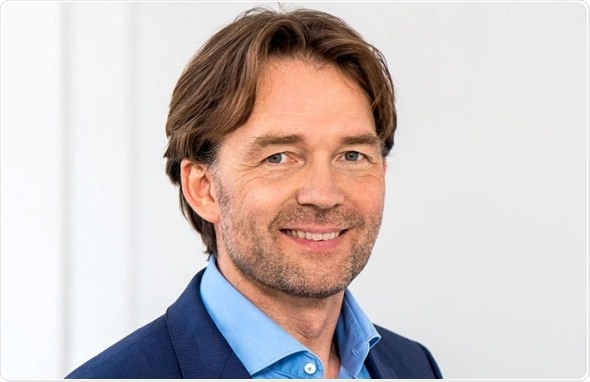
© Astrid Eckert/Technical University of Munich
German Federal Education and Research Minister Anja Karliczek welcomed the new appointment:
Helmholtz Association President Professor Otmar D. Wiestler adds:
In Matthias Tschöp, we have an internationally renowned, multi-award-winning scientist taking the helm of Helmholtz Zentrum München. I am delighted that we’ve been able to attract a CEO with a long history of involvement with this excellent center and whose vision will guide its future development."
A promising example of this is the Helmholtz Pioneer Campus, which Tschöp, in his role as Founding Director, has recently helped establish. The outstanding international reputation of Helmholtz Zentrum München was confirmed by a comprehensive evaluation carried out earlier this year. “Reaching this level of preeminence is an outstanding achievement that goes to the credit of former CEO Günther Wess. The Helmholtz Association owes him a debt of gratitude – also for his service as Vice President.”
Matthias Tschöp joined Helmholtz Zentrum München in 2011, initially as Director of the Institute for Diabetes and Obesity. At the same time, he also became the first medical doctor with an Alexander von Humboldt Professorship to be appointed Chair of Metabolic Diseases at the Technical University of Munich. Before that, he spent 12 years working in the USA, where he retains his position of visiting professor at Yale University.
On taking up his post in Munich, Matthias Tschöp initially dedicated himself to bringing together disparate lines of diabetes research, both within Helmholtz Zentrum München and beyond. Today a staff of around 500 work at the Helmholtz Diabetes Center (HDC), its partner groups at the two Munich universities and their branches in Tübingen, Dresden and Leipzig. Both as HDC Director and through his own research efforts, Matthias Tschöp has been instrumental in positioning Germany at the vanguard of international diabetes research. Together with his team, he has discovered key processes in the communication between the gastrointestinal tract and the brain and, building on this, has developed innovative drug candidates to combat diabetes and obesity which are currently undergoing promising clinical trials.
An interdisciplinary visionary
Matthias Tschöp has close connections both at home and on the world stage, a fact highlighted by the Helmholtz Diabetes Conference, which he helped set up and which each year draws large numbers of leading international scientists to the Bavarian capital. The medical doctor always looks beyond the boundaries of his own research field and is constantly seeking exchanges with other scientific disciplines: As Founding Director of the new Helmholtz Pioneer Campus, he has already introduced a new concept to the Helmholtz Association where top young international researchers from the fields of engineering, chemistry, physics, mathematics, computer science and biology team up with clinicians to develop and apply groundbreaking new technologies with the aim of ushering in a future of personalized preventive and therapeutic precision medicine.
“The future of scientific endeavor lies in uniting a broad range of key disciplines under one roof,” Matthias Tschöp explains. “As the largest biomedical research center in Bavaria and with its wide-ranging scientific disciplines – from plant genetics to neurobiology – and its wealth of top-notch young talent from all over the world, Helmholtz Zentrum München is ideally poised to find novel solutions to the major medical challenges facing our society in collaboration with the two Munich universities and other Helmholtz Centers in Germany that focus on life sciences. Within this strategic group, we will be investing heavily in the latest artificial intelligence strategies, which are already well established at the Center. In doing so, we hope to improve our understanding of the complex interplay between health and the environment and to speed up the translation of basic research into practical applications to the tangible benefit of society.”
Matthias Tschöp’s scientific achievements have already been recognized with numerous honors, including the Erwin Schrödinger Prize, the Paul Martini Prize, the Hansen Family Award, the Endocrine Society Innovation Award, an ERC Advanced Grant and the American Diabetes Association and Obesity Society Outstanding Scientific Achievement Awards. In 2017 he was awarded the Carus Medal of the German National Academy of Sciences Leopoldina, and in 2018 he was inducted into the Bavarian Academy of Sciences and Humanities. Matthias Tschöp also holds an honorary doctorate from the University of Leipzig.
Matthias Tschöp follows in the footsteps of Günther Wess, who, after 13 years as CEO, is now placing the fate of Helmholtz Zentrum München in new hands:
I’m absolutely certain that Matthias Tschöp is an outstanding choice for this position. I wish him, and of course the Center, all the best for the future!"
Matthias Tschöp will manage the Center in collaboration with Administrative Director Heinrich Baßler and Technical Director Dr. Alfons Enhsen.